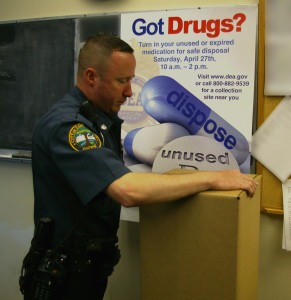DEA officials said Coatesville collected 85 pounds during National Drug Take Back Day
By Kathleen Brady Shea, Managing Editor, The Times

Coatesville Police Officer Rodger Ollis seals one of the three boxes of unwanted medicine collected Saturday during the National Drug Take Back initiative.
Maybe Coatesville Police Officer Rodger Ollis has been spending too much time in the gym: His 20-pound estimate for each of the three boxes of unwanted medicine collected on Saturday during the National Drug Take Back initiative came up short.
On Tuesday, the Coatesville Police Department learned the exact figure from a group supervisor for the Drug Enforcement Agency (DEA) in Philadelphia. Coatesville’s contribution totaled 85 pounds, the DEA official said .
Ollis said previous collections have not come close to Saturday’s numbers, ranging from a low of five pounds on April 28, 2012, to a high of 16 pounds on April 30, 2011.
Coatesville Police Chief Jack Laufer said he was extremely pleased with the results and extended his gratitude to all of the participants in the national DEA-sponsored program. He said he hoped the higher totals resulted from increased awareness about the risks of storing unwanted or expired prescriptions.
“It absolutely exceeded our expectations,” he said of the event, which the Coatesville Police Department administered with the Coatesville Youth Initiative. Laufer said he also wanted to make sure that residents realize that they don’t have to stockpile unwanted prescriptions until the next Take Back event. “Don’t hesitate to bring them in anytime,” he said. “You don’t have to wait.”
Getting the drugs out of homes prevents abuse in many ways, Laufer said. He said young children can ingest them by accident, and older children sometimes experiment with them. “We’ve seen pill-sharing parties where the drugs get thrown in a bowl and the kids divvy them up,” he said. Keeping expired drugs in medicine cabinets can make homes a burglary target and also increase the risk that an older patient may become confused and take the wrong pill, he said.
Studies show that a majority of abused prescription drugs are obtained from family and friends, including home medicine cabinets. In addition, Americans have been advised by the DEA that the usual methods for disposing of unused medicines — flushing them down the toilet or throwing them in the trash — both pose potential safety and health hazards. The prescription drugs turned in at collection sites are placed in special containers and delivered to a main DEA site for disposal, Laufer said.
In his defense, Ollis said he did not spend a lot of time calculating the drugs’ weight; he was just glad to receive them. “I never lose sight of the idea that one single pill in the wrong hands could begin a life-long struggle with addiction,” said Ollis. “Who knows? It is possible that we collected that pill on Saturday.”






